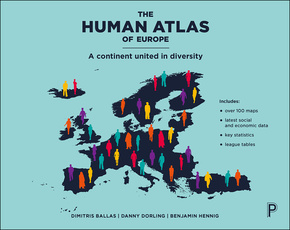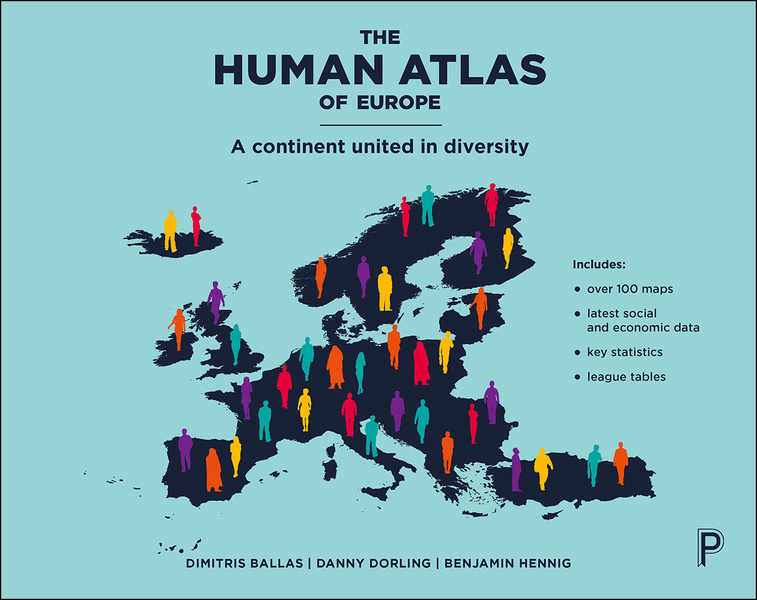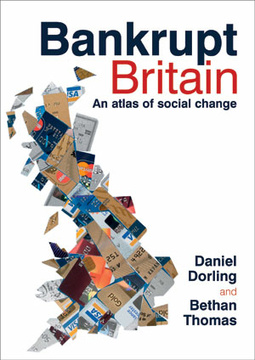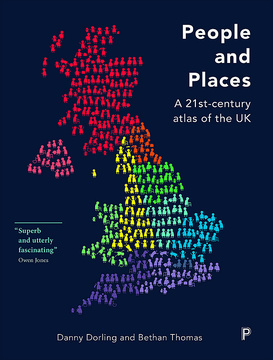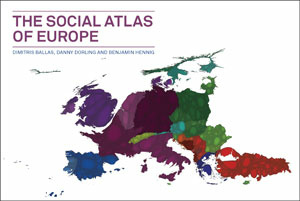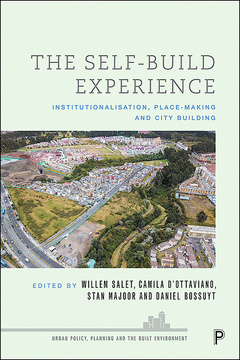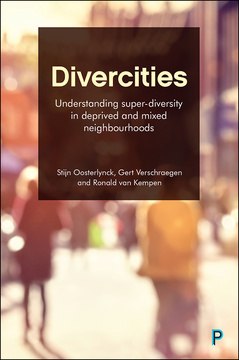The Human Atlas of Europe
A Continent United in Diversity
By Dimitris Ballas, Danny Dorling and Benjamin Hennig
Published
Apr 24, 2017Page count
188 pagesISBN
978-1447313540Dimensions
290 x 230 mmImprint
Policy PressWhat does Brexit actually mean for the UK and what are the wider implications for Europe? Was the UK ‘leave’ vote actually symptomatic of broader issues within Europe such as population mobility and the rise of non-traditional parties?
Written by leading international authors, this timely atlas explores Europe’s society, culture, economy, politics and environment using state of the art mapping techniques
With maps covering over 80 topics ranging from life expectancy, greenhouse gas emissions, GDP to Eurovision voting, The Human Atlas of Europe addresses fundamental questions around social cohesion and sustainable growth as Europe negotiates the UK’s exit while continuing through the economic crisis.
This concise, accessible atlas is packed with exciting features, including:
•short introductions to each topic
•maps using the very latest data
•infographics bringing this all to life
•summaries of key information including league tables
•core statistics on Europe
Taken as a whole, the atlas shows how geographical and state boundaries only tell a partial story and that we still live in a far more cohesive Europe than we realise.
"An essential catalyst for teacher-pupil discussions, and an authoritative source of information as we move towards a post-Brexit world." Living Geography
"A truly fascinating book which explores in a state of the art, visual way a whole series of topics about European life, societies and populations. The book combines clear text and infographics to present an innovative way of thinking about, and seeing, Europe, in all its rich diversity and surprising cohesion. Packed with information about an array of key challenges currently facing Europe." Susan Millns, University of Sussex
"A visually stunning atlas, the best of art and information combined. Although worthy of standing on its own, it also provides an indispensable companion to the social, economic, and political changes sweeping Europe." Rachel S. Franklin, Spatial Structures in the Social Sciences (S4), Brown University
"An effective and engaging atlas of Europe" The Society of Cartographers Bulletin
“A stimulating and unique perspective to the understanding of Europe as a political entity facing identity and culture challenges at a time of great crisis.” Pierre Vercauteren, Université Catholique de Louvain
“Post Berlin-Wall Europe is a continent united by its common geography and the EU. This outstanding work gives answers to the economic challenges and inequalities between its different regions to help forge a common destiny. Committed Europeans will read it as a work of self-knowledge.” Gazmend Kapllani, author of A Short Border Handbook
"A fascinating, accessible and timely guide to modern Europe, providing an essential toolkit for understanding the continent post-Brexit." Dawn Foster, The Guardian
‘Think you know Europe? Think again: this is a captivating window on the deeper realities of the Europe we share’. Kevin Featherstone, European Institute, London School of Economics and Political Science
"Both scientifically extremely valuable and ethically intriguing and challenging, as it tackles our representation of the territory from a human and social perspective.'' Sergiu Miscoiu, Babes-Bolyai University Cluj-Napoca
"An exceptional contribution to our understanding of who we are as Europeans. When we look at Europe from the outside, we find much more in common than divides us. This book traces the contours of those commonalities and brings them to life." Roger Casale, Founder and CEO, New Europeans
Dimitris Ballas is Associate Professor in the Department of Geography at the University of the Aegean. He has published widely in the fields of Social and Economic Geography, Regional Science and Geoinformatics in the Social Sciences.
Danny Dorling is a Professor of Geography at the University of Oxford. His recent books include The 32 Stops: Lives on London’s Central Line and (with Bethan Thomas) People and places: A 21st century atlas of the UK.
Benjamin Hennig is Associate Professor of Geography at the University of Iceland and author of the website www.viewsoftheworld.net
A. Introduction
B. Population
C. Wealth and Poverty
D. Health
E. Education
F. Work
G. Environment
H. Politics
I. Identity and Culture
J. EU Budget
K. Conclusion







